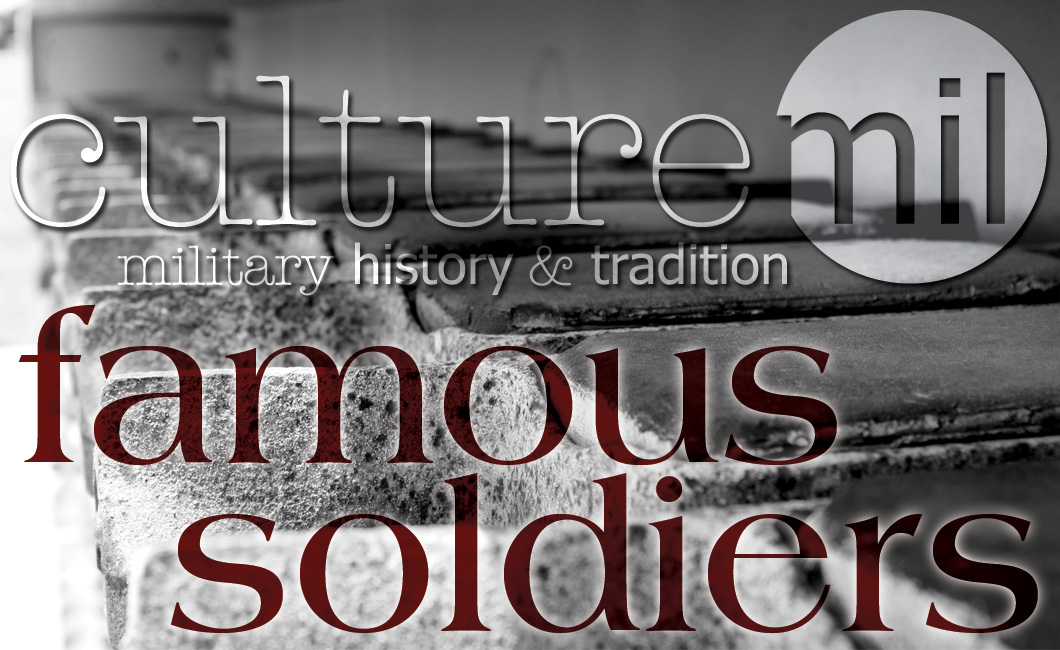- http://www.biography.com/people/groups/air-force
- https://en.wikipedia.org/wiki/Category:United_States_Army_soldiers (*for a more complete list)
- http://blog.customink.com/2012/11/army-slogans-sayings/
- http://www.unr.edu/nwhp/bios/women/winnemucca.htm
- http://schulzmuseum.org/about-the-man/schulz-biography/
- http://www.jackierobinson.org/wp-content/themes/jrfwebtwo/pdf/Jackie%20Robinson%20bio.pdf
- http://www.biography.com/people/jackie-robinson-9460813#synopsis
Written by Jenifer Chrisman on June 27, 2016.
From actors to presidents, scientists to athletes, politicians to authors, they all had one thing in common…at one point or another in their lives they were United States Soldiers. Some were famous before they joined. Some began to distinguish themselves during their service. And others became notable after.
The Army’s list of notables is…extensive, taking their old recruiting slogan, “Be All You Can Be” (1980-2001), to heart.
While much is lost over time, and some names have become nearly obscure, each in their own way made a contribution to the rank and file. They deserve to be recognized, not just for their fame, but for their service to this country. And while there are far too many to name* them all, below is a list of one hundred names, along with three short standout bios, of famous Soldiers.
Jack Roosevelt “Jackie” Robinson (1919-1972) was the first black player to break the color barrier and play for the Major Leagues. After moving from Georgia to California, he attended Pasadena Junior College where he played football, basketball, baseball and ran track and later continued his education at UCLA and earned varsity letters for four sports in one year. Due to financial hardship he left college just shy of graduation and moved to Hawaii where he played semi-professional football. His season cut short, Robinson served in the United States Army as a Second Lieutenant. He was arrested and court-martialed in 1944 for refusing to move to the back of a segregated bus, but later acquitted and honorably discharged. He began playing for the Negro Leagues. He was quickly recruited by Branch Rickey, president of the Brooklyn Dodgers, joining the all-white Montreal Royals farm team in 1946. Robinson played his first game for the Dodgers on April 15, 1947. Knowing Robinson would face opposition and racism, Rickey made him promise not to fight back. Despite slurs, threats and insults, his outstanding start and successful year with the Royals lead to his promotion to the Dodgers. Harassment continued with some team members and players on opposing teams refusing to play, fans shouting insults and, most notably, manager Ben Chapman and the Philadelphia Phillies shouting derogatory remarks at Robinson during a game. Others stood up for him, including Dodgers team captain Pee Wee Reese. Reese’s gesture of camaraderie, walking up and placing his arm around Robinson’s shoulder during the Phillies match, has entered into baseball legend. Jackie Robinson died on October 24, 1972. According to his biography (jackierobinson.org), “He overcame unimaginable bigotry and, during his ten-year career, was named Rookie of the Year (1947), Most Valuable Player (1949) and won a World Series title (1955). His .311 batting average, 197 stolen bases and six All-Star game appearances ensured his enshrinement into the Baseball Hall of Fame in 1962.”
Charles M. Schultz (1922-2000), nicknamed “Sparky” after the Barney Google comic strip horse Spark Plug, always knew he wanted to be a cartoonist. With his mother’s encouragement he completed the Federal School of Applied Cartooning (now Art Instruction Schools) correspondence course in high school. In 1943, within days of each other, Shultz’s mother passed away and he left to begin a tour in the U.S. Army. He served until the end of the war, having attained the rank of Staff Sergeant. After returning home he and his father shared an apartment and he dug in to attain his passion of becoming a professional cartoonist. With some local success, as well as intermittent one-panel cartoons in The Saturday Evening Post, he hit the national market on October 2, 1950, when the first Peanuts strip appeared in seven newspapers nationwide. Those quirky kids with overlarge heads and intellects beyond their years made a global impact, especially that most loveable of losers…Charlie Brown. Throughout his career, until he retired in December of 1999, the characters remained fresh, yet comfortable. With just the right amount of reality and flights of fancy, they became part of American culture. At the time of Schultz’s retirement the Peanuts characters had book collections translated into over twenty-five languages and were syndicated in over 2,600 newspapers worldwide. Charles Schultz died on February 12, 2000. According to his biography (schulzmuseum.org), “He has been awarded with the highest honors from his fellow cartoonists, received Emmy Awards for his animated specials, been recognized and lauded by the U.S. and foreign governments, had NASA spacecraft named after his characters, and inspired a concert performance at Carnegie Hall.”
Sarah Winnemucca (1844-1891), born Thocmetony (“shell flower”), of the Northern Paiute, was a lecturer, activist, school organizer, author, scout, messenger and interpreter. She lived with one foot in the white man’s world and one in the Indian Nation. While Sarah’s grandfather, Chief Truckee, welcomed the white men to their lands (what is now western Nevada), her father, Chief Winnemucca, did not trust them. These opposing viewpoints were, in all likelihood, the catalyst that inspired her to attempt to create understanding between her people and the white men, as well as defend Paiute rights. Sarah first met white people at the age of six when she accompanied her grandfather to California. At thirteen, he arranged for her and her sister, Elma, to become members of Major Ormsby’s household. By fourteen, Sarah spoke three Indian dialects, as well as English and Spanish. By the time she turned twenty-seven, all Indian tribes, including her own, were moved onto reservations. She began working as an interpreter for the Bureau of Indian Affairs and, after the agent in charge of her people’s reservation was replaced with someone who treated them unfairly, she prepared to travel to Washington, D.C., to defend them. The trip was interrupted in 1878 when she offered the Army her services as a scout and interpreter during the Bannock war. She arrived in Washington in 1880 and pled her people’s case before President Rutherford B. Hayes and Secretary of the Interior Carl Schurz. Promises were made and broken, causing her own people to distrust her. Despite this, Sarah continued to give speeches (more than 400) in an attempt to gain support for them. She also opened the “Peabody’s Institute,” a school for Indian children where she taught. The school was closed after her husband’s death. Sarah’s book, “Life Among the Paiutes,” was published in 1883, the first book ever published by a Native American woman during a time when women didn’t yet have the right to vote. It was a personal appeal from the Native American viewpoint in a language not her own. Sarah Winnemucca died on October 17, 1891, believing herself a failure in the plight to help her people. Posthumously, she was awarded the Nevada Writers Hall of Fame Award and Sarah Winnemucca Elementary was named in her honor in 1994.
100 FAMOUS SOLDIERS
| Name | Occupation | Rank |
|---|---|---|
| Spiro Agnew | Governor (Maryland), U.S. Vice President | Captain |
| Desi Arnaz | Actor | Staff Sergeant |
| James Arness | Actor, Radio Personality | Corporal |
| Romare Bearden | Painter, Illustrator | Sergeant |
| Ambrose Bierce | Philosopher, Author, Editor, Journalist | Brevet Major |
| Joey Bishop | Talkshow Host, Actor, Comedian | Sergeant |
| Florence Blanchfield | Nurse, Superintendent of the Army Nurse Corps | Lieutenant Colonel |
| Walter Brennan | Actor | Private |
| William J. Brennan Jr. | Supreme Court Justice | Colonel |
| Ron Brown | Government Official, Lawyer | Captain |
| Scott Brown | U.S. Representative, Lawyer | Colonel |
| William F. Buckley Jr. | Academic, Political Scientist, Journalist, Television Personality | Second Lieutenant |
| Ambrose Burnside | Governor (Rhode Island), U.S. Senator | Major General |
| Aaron Burr | U.S. Vice President, U.S. Representative, Lawyer | Lieutenant Colonel |
| Benjamin F. Butler | Military Leader | Major General |
| George Rogers Clark | Military Leader, Explorer | Brigadier General |
| Buffalo Bill Cody | Actor, Military Leader, Folk Hero | Chief of Scouts |
| Jackie Cooper | Actor, Producer | Captain |
| Howard Cosell | Talkshow Host, News Anchor | Major |
| Randy Couture | Actor, Reality Television Star, Boxer | Sergeant |
| Jefferson Davis | Government Official | Colonel |
| Charles G. Dawes | U.S. Vice President, Diplomat, Minister | Brigadier General |
| James Dickey | Author, Poet, Literary Critic | Second Lieutenant |
| Robert Duvall | Actor | Private First Class |
| Gerald Edelman | Biologist, Immunologist, Scientist, Neurologist, Doctor | Captain |
| Dwight D. Eisenhower | Journalist, U.S. President | General of the Army |
| Will Eisner | Illustrator | Chief Warrant Officer |
| M. Joycelyn Elders | Civil Servant, Medical Professional, Doctor | First Lieutenant |
| Eddie Fisher | Singer | Private First Class |
| F. Scott Fitzgerald | Author | Second Lieutenant |
| Malcolm Forbes | Publisher, Business Leader | Staff Sergeant |
| Clark Gable | Actor | Major |
| James Garfield | U.S. Representative, U.S. President | Major General |
| Ulysses S. Grant | U.S. President | General |
| Chuck Hagel | U.S. Representative | Sergeant |
| Alexander Haig | Government Official, Diplomat | General |
| Nathan Hale | Warrior, Spy, Military Leader | Captain |
| Alexander Hamilton | Political Scientist, Government Official, Journalist, Military Leader, Economist, Lawyer | Major General |
| Dashiell Hammett | Author | Sergeant |
| Benjamin Harrison | U.S. President | Brevet Brigadeer General |
| Walter Haut | Military Leader | First Lieutenant |
| Rutherford B. Hayes | Governor (Ohio), Military Leader, U.S. Representative, U.S. President, Lawyer | Major General |
| Benjamin Hooks | Civil Rights Activist, Minister, Judge, Lawyer | Staff Sergeant |
| Charles H. Houston | Educator, Civil Rights Activist, Lawyer | First Lieutenant |
| Edwin Hubble | Astronomer, Scientist | Major |
| Duncan Hunter | U.S. Representative | Captain |
| Roy Innis | Civil Rights Activist | Sergeant |
| Stonewall Jackson | Educator | Lieutenant General |
| Henry Kissinger | Political Scientist, Diplomat | Sergeant |
| Don Knotts | Actor, Comedian | Technician Fifth Grade |
| Ed Koch | Mayor (NYC), U.S. Representative | Sergeant |
| Kris Kristofferson | Actor, Songwriter, Singer | Captain |
| Louis L’Amour | Author | Lieutenant |
| Fiorello La Guardia | Mayor (NYC), U.S. Representative | Major |
| Tom Landry | Coach | First Lieutenant |
| Norman Lear | Screenwriter, Producer, Pilot | Technical Sergeant |
| Len Lesser | Actor | Sergeant |
| Meriwether Lewis | Explorer | Captain |
| Charles Lindbergh | Inventor, Pilot, Writer | Brigadier General |
| Douglas MacArthur | General | General of the Army |
| Norman Mailer | Author, Journalist | Sergeant Technician |
| John Marshall | Supreme Court Justice | Captain |
| Glenn Miller | Conductor, Songwriter | Captain |
| Tom Mix | Civil Servant, Law Enforcement, Actor | Sergeant |
| James Monroe | Governor (Virginia), Government Official, Diplomat, Military Leader, U.S. Representative, U.S. President | Major |
| Audie Murphy | Actor | Second Lieutenant |
| Frank Murphy | Mayor (Detroit), Supreme Court Justice | Lieutenant Colonel |
| A.C. Nielsen Jr. | Business Leader | Major |
| Leonard Nimoy | Actor | Sergeant |
| George Patton | General | General |
| M. Scott Peck | Journalist, Psychiatrist | Lieutenant Colonel |
| Horace Pippin | Painter, Warrior, Military Leader | Corporal |
| Colin Powell | Diplomat, Military Leader | General |
| Elvis Presley | Actor, Singer | Sergeant |
| Charles Rangel | U.S. Representative, Activist | Staff Sergeant |
| Ronald Reagan | Radio Annoucer, Actor, Governor (California), U.S. President | Captain |
| Walter Reed | Scientist, Medical Professional, Doctor | Major |
| Eddie Rickenbacker | Business Leader, Racecar Driver, Pilot | Major |
| Tom Ridge | Governor (Pennsylvania), Government Official, U.S. Representative | Staff Sergeant |
| Jackie Robinson | Pro Baseball Player | Second Lieutenant |
| David Rockefeller | Business Leader, Philanthropist | Captain |
| Gene Roddenberry | Screenwriter, Producer | Captain |
| Andy Rooney | News Anchor, Journalist | Staff Sergeant |
| Charles Schulz | Illustrator, Writer | Staff Sergeant |
| Maxwell D. Taylor | Government Official, Military Leader | General |
| Dave Thomas | Chef, Television Personality | Staff Sergeant |
| Strom Thurmond | Governor (South Carolina), U.S. Representative | Major General |
| Pat Tillman | Athlete, Pro Football Player | Corporal |
| Sam Walton | Business Leader, Entrepreneur | Captain |
| Earl Warren | Governor (California), Supreme Court Justice | First Lieutenant |
| George Washington | U.S. President | General and Commander in Chief |
| Harold Washington | Mayor (Chicago), U.S. Representative | First Sergeant |
| Caspar Weinberger | Government Official, Lawyer | Captain |
| Hoyt Wilhelm | Pro Baseball Player | Staff Sergeant |
| Hosea Williams | Civil Rights Activist, Minister, Philanthropist | Staff Sergeant |
| Sarah Winnemucca | Journalist | Scout, Messenger, Interpreter |
| Leonard Wood | Military Leader, Doctor | Major General |
| Walter Bigelow Wriston | Business Leader | Second Lieutenant |
| Alvin C. York | Warrior, Military Leader | Sergeant |
| Darryl F. Zanuck | Producer | Colonel |
Sources:
⇠ Return to Culture.Mil Category Page



